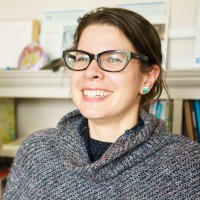
Purdom Lindblad
In the Republic of the Imagination, Azar Nafisi champions reading as a way to open ourselves to deepen empathy and entice our curiosity. Inspired, I am developing ways of documenting and visualizing not only what I read, but also what caused me to read using linked open data. Through a custom Jekyll plugin, RDFa triples are extracted from my reading notes text files. The plugin writes JSON-LD triplets, which are then used as input for a variety of visualizations.
Tracing reading reveals the breadths and depths of interconnected themes among works that, initially, are connected simply because I noticed one influenced me to read the other. The visualizations enable movement between big-picture views of the corpus and close-readings of individual books and can reveal adjacent possibilities in themes, readings, as well as shape questions that may be currently unarticulated.
Influenced by feminist interface design, this talk will focus on the design and creation of visualizations – as finding aids, as maps into the landscape of a personal corpus.
See below for a Storify recap of this Digital Dialogue, including live tweets and select resources referenced by Lindblad during her talk.
Purdom Lindblad is the Assistant Director of Innovation and Learning at MITH. She has an MA in American Studies from Michigan State University and an MS in Information Science from the School of Information, University of Michigan. Interested in digital humanities since graduate school, Purdom has worked at Michigan State University’s Matrix, Virginia Tech Libraries, and the Scholars’ Lab at the University of Virginia Library.
Purdom is broadly interested in the implicit and explicit effort that digital humanities can do for social, cultural, and environmental justice. Applying principles from Feminist Interface Design, Purdom and her Scholars’ Lab colleague Jeremy Boggs, explore how the process of feature development and public documentation shape the experience of users and render the theoretical underpinnings of digital work more accessible. Recent publications include Praxis, a keyword in the MLA Commons Digital Pedagogy in the Humanities: Concepts, Models, and Experiments written with Bethany Nowviskie and Jeremy Boggs as well as a forthcoming chapter in Making Humanities Matter, edited by Jentery Sayers.
A continuously updated schedule of talks is also available on the Digital Dialogues webpage.
Unable to attend the events in person? Archived podcasts can be found on the MITH website, and you can follow our Digital Dialogues Twitter account @digdialog as well as the Twitter hashtag #mithdd to keep up with live tweets from our sessions. Viewers can watch the live stream as well.
All talks free and open to the public. Attendees are welcome to bring their own lunches.
Contact: MITH (mith.umd.edu, mith@umd.edu, 301.405.8927).
